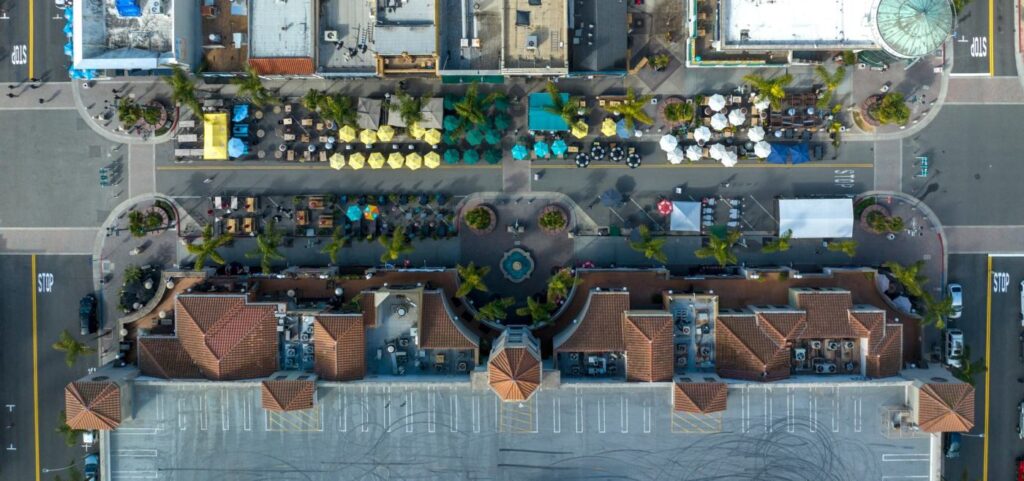
Outdoor patios and seating set up in the roadway along Huntington Beach’s Main Street during the height of the coronavirus pandemic need to be gone by March 1.
Some say the outdoor seating on the second block of Main Street has offered a place to soak in the year-round sunshine, adding a pedestrian-friendly option that allowed some restaurants to thrive and gave visitors a safe open-air space while COVID-19 spread.
Others argue the street closures are now unnecessary as pandemic concerns ease, eating up valuable parking and negatively impacting other nearby businesses, creating an area plagued with trouble especially when alcohol-infused customers spill out of the bars.
A divided Huntington Beach City Council has chosen to nix the pandemic-era closure of the second block of Main Street, an artery that runs through town leading to the famous pier and the beach. Parking meters will also be reinstated.
Discussions ramped up the past year around revitalizing the downtown area, with the city holding study sessions and exploring options for bringing a new look and configuration to Main Street.
Just a few months ago, before four new councilmembers were elected in November, plans were moving forward for a downtown “streetscape” project that explored making the street closure permanent along with other aesthetic changes to the area.
But this week, new Councilmember Gracey Van Der Mark instead proposed to her council colleagues returning Main Street to its pre-pandemic status.
“The current outdoor dining and retail expansion, including the second block closure, is not warranted any longer,” she said.
Closure of the second block has brought “avoidable blight, increase in transient occupation and created an increase in health and safety concerns,” she added.
Originally, the expansion served two purposes: to assist small businesses in continuing revenue generation during the pandemic and to allow safe, outdoor dining and retail shopping to reduce the spread of COVID-19, she said. “However, we are in 2023; the COVID-19 pandemic is over.”
The proposal garnered mixed opinions from dozens of residents and business owners, some who wrote in leading up to the recent council meeting and some who showed up in person to speak.
Property owner Mitch Caldwell argued for keeping the expanded outdoor seating, which could impact some businesses that are barely making ends meet.
“I would hate to see long-standing staples of this community disappear because they were unable to generate enough revenue to make things work,” he wrote to the city.
Cheri Boggeln, owner of two businesses on Main Street, also wanted to see the second street closure stay in place.
“Survival in the restaurant business in the current economic environment is extremely difficult, even with the additional seating we have been able to install since COVID,” she wrote to the city, noting that labor is greater than 50% of gross sales and food costs have skyrocketed.
But others who are outside of the outdoor dining zone on the second block of Main Street argue the set up is unfair, giving only some businesses the allowance while others suffer, with a disjointed layout that keeps people from flowing down to the third block.
Bob Bolen, who has a real estate business on the third block, said the lack of connectivity hurts business, as does the reduced number of parking spots. It’s like a “ghost town,” he said of that more inland block.
Jim Hall, owner of Surf City Ale House, jumped at the opportunity to lease a spot on the third block in 2019, but now his business is close to failing, he said. “The party is on the second block and we’re a half a block off.”
The second block closure has caused safety and security issues, issues with parking and homeless congregating, as well as created an environment that is not family friendly, added John Raymer, general manager of Fred’s Mexican Cafe at the corner of Main Street and Pacific Coast Highway.
“I love beach cities, I’ve been coming to Huntington Beach most of my life,” he said. “When I have guests coming to me saying they feel afraid – it’s disturbing what’s going on out there.”
Councilmember Dan Kalmick voted against ending the street closure, saying much work has been done to study ways to fix some of the issues plaguing Main Street.
“We saw visioning plans and had meetings to talk to community members,” he said. “You’re never going to find a solution that makes everyone happy. There’s winners and losers no matter what public policy we choose.”
“I think we’re going to have a lot of angry residents,” he added.
But Van Der Mark argued the community was told the changes to Main Street’s layout were temporary to help businesses during the pandemic and it seems dishonest to make things permanent without more input. A solution might be to put the issue on a ballot to let voters decide, she said.
“I want downtown to be beautiful, safe and prosperous, but we can’t go and trick the community,” she said.
The loss of parking spots has also resulted in a decrease in revenue to the city, she said.
In 2019, downtown parking meters brought in an estimated $335,000. Last year, they generated less than half that figure.
Oscar Carrillo, general manager for Main Street Wine Company, suggested a total shutdown of Main Street instead of just the second block.
“I think it,” he said, “it should be all closed down for all of us.”
Related Articles
Slain Riverside County Deputy Darnell Calhoun’s family receives home
Rose Parade will march to its own musical theme in 2024
Cypress snowy owl watchers worry she’s left roost in neighborhood
Inside the politics of Westminster’s Tet parade
San Clemente hires new city manager with beach town experience
